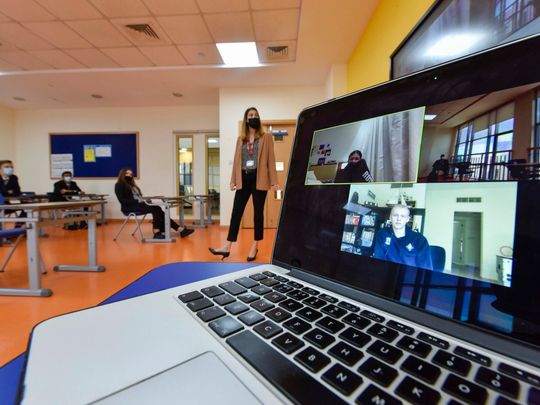The pandemic has affected almost every industry in some form, with the education sector being hit particularly hard.
The outbreak of coronavirus forced 195 countries to close down schools and colleges earlier this year, affecting more than 1.5 billion children and youth, according to UNESCO estimates. Educators and students and even their parents, had to adapt to extraordinary circumstances when schools closed their doors to control the spread of virus in March.
However, with their flexible approach, schools in the UAE managed to quickly shift to virtual learning harnessing their digital readiness. And when educational institutions reopened in August after months of remote education, schools successfully implemented hybrid models of teaching as some students returned to the classroom while others opted for e-learning.
While the pandemic has upended the education system, this has stimulated innovation within the sector, allowing schools in the country to experiment and find new ways to connect with learners.
“In one broad sweep the world of education was transformed this year,” says Nargish Khambatta, Principal, GEMS Modern Academy and Vice President – Education, GEMS Education. “Never before has the role of the educator been under so much scrutiny. Lessons were being beamed into homes, and parents, who were facing a lockdown themselves, suddenly had a peek into their children’s classrooms. While that was initially a little daunting for teachers, they quickly earned the respect of the parent community,” she says.
However, innovation was at its best during this time as teachers crafted netiquette rules, co-created ways of working with their students and leveraged technology for conducting authentic assessments for learning. “They handed over sharing rights of study resources to students who became co-presenters and established breakout rooms for collaboration. 2020 has been an exciting year for us,” adds Khambatta.
In the new educational landscape, technological resources and pedagogical innovation have begun to play as important a role as the quality of faculty. While this has not been easy for schools to balance needs of classroom pupils and distance learners at the same time in the present academic term, UAE schools managed to overcome many of the critical challenges with right tech tools.
“By far the biggest innovations have resulted from meeting the challenge of delivering instruction simultaneously to students who are either physically present in the classroom, or are at home,” says Dr Paul Richards, Superintendent, American School of Dubai (ASD).
“Students now receive tailored instructions on what they have to know and are able to do if they are either at home or in the classroom. Teachers have become adept at redesigning lessons to accommodate this bifurcation of pedagogy. For example, a science classroom may have lab partners split between home and classroom, where they complete an experiment together, each playing a specific role based on their location. Math teachers are using a pen tablet that serves as a virtual white board, making it seamless for those at home to see notes. Technology has become a unifier and a conduit to connect home and school.”
The public health crisis has demonstrated the importance of strengthening the resilience of education systems to adapt to changes and unforeseen circumstances. It has also presented an opportunity for educators to rethink education models, learn the right lessons from the current situation and leapfrog into more innovative, personalised and sustainable mode of teaching and learning.
“Any school worth its salt will not return to normal in the future. Ownership of learning has shifted to the student, who can now develop the agency skills requisite for their future in an on-demand learning environment. Schools will look differently on the brick and mortar requirements, showing more flexibility with when students can access their learning off campus, whether digitally, or through field experiences,” says Dr Richards.
However, the most important lesson that schools have learned during the crisis is a reminder of the importance of social and emotional skill development in students, and connection, he says. “Skills and dispositions such as resilience, self-reflection, and empathy are critical for not only coping with the uncertainty of a pandemic, but to thrive amidst it.”

